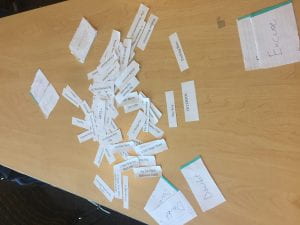Excuses! is a game where players, playing as workers, battle each other by improvising stories to blame other worker for corporate inefficiency. If the Boss thinks you’re making too many excuses, you’ll have to pack up your belongings.
For my first concept for the game, I wanted to implement some system inspired from the Chinese social credit system as a way to make a commentary on it. The first core mechanic revolved around a Coup like gameplay whereby players each had different actions they could take each turn which could both help themselves and hurt others in terms of social credit and wealth. Unfortunately after playtesting I soon realized the current system I had just wasn’t fun. From the first game idea, where players played as workers in a factory, I was inspired to create a game that had the same concept of factory workers betraying each other as a way to climb some corporate ladder. I opted for a LARP style improv game where a boss would question workers on why they are to blame for factory efficiency, and the workers would need to make excuses on the fly to say why they weren’t at fault and that it was one of the other worker’s faults. If the boss feels like the worker’s don’t make an adequate excuse, then they can give that player an excuse card. When a player gains three excuse cards they lose and the game is over. As an aesthetic decision I choose that unlike the first iteration, I wanted this game to be much more lighthearted and funny. I added a mechanic where workers would play different cards with short silly phrases on them such as “Faking the Moon Landing,” and the workers would need to use that phrase as part of their excuse. Many of these cards are fantasy and science fiction related to try to push players to be more inventive with their stories. I tried an iteration where there wasn’t a boss to try and create a more natural dynamic, but I found that the boss really help to push the game forward. On my second playtest I implemented a doubt system, where another play could play one of their three doubt cards to falsify another player’s information so they would need to redirect their story. The second playtest went really well with the workers going back and forth rapidly, my intended behavior. The game ended with only three of the seventy-two cards left in the deck, so I chose to increase the total number of cards to one hundred and fifty. I also polished up the ruleset so that it would be more understandable to new players without any guidance.
As an expression, my first game was originally going to be a commentary on the Chinese social credit system and the incentives it creates for people to go against one another for their own personal gain. I took some of the mechanics from real world situations involving social credit and based the monetary loss and gain off of actual statistics for the places in China where social credit is already implemented. Unlike some of the anti-war games discussed in class where players were usually the one’s acting upon the object of artistic focus, I wanted the players to be immersed in a world where they are competing for social credit. I was inspired by games like Papers Please and September 12th where players took on roles in these societies that were impacted by the object of artistic focus. I thought about if I wanted the game to be very serious or very lighthearted and decided that if I wanted players to actually play my game and take away some meaning from it it would need to be enjoyable enough to continuously play. My philosophy with these serious games is that the entertainment should come first, and the artist’s message should basically be subtle for players who are looking for a deeper meaning in their games to find. When I tried to make my existing game lighthearted, it seemed to lose a lot of its character. Instead I decided to take the behavior of workers betraying each other and use that as the medium for an improv game. I was inspired by The Institute where players were given seemingly random instructions and were put in absurd situations which allowed the players to immediately feel the artistic message of the game through their actions alone, so I added the card mechanic which with its silly design, forced players to get comfortable in this strange corporate, yet fictional world. To add more depth to the behavior of players and to encourage them to blame each other I added the doubt mechanic, where players could go back and forth battling with improvisation. Overall, I feel that my game was successful in creating a narrative where workers would compete in a corporate atmosphere to gain the favor of their higher-ups.

Aftermath of Excuses!
